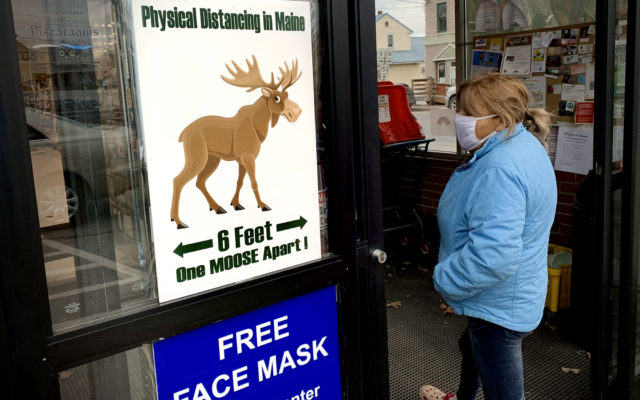
In secret, Piscataquis commissioners adopted COVID-19 measure filled with misinformation
By David Marino Jr., Bangor Daily News Staff
Piscataquis County’s three commissioners likely violated Maine’s open meeting laws when they adopted a resolution that objects to Gov. Janet Mills’ COVID-19 measures, makes numerous false statements and refers to the coronavirus as the “Wuhan Virus.”
The three commissioners unanimously adopted the resolution on Jan. 13 after a series of emails and phone calls, Chair James White said Monday. The public did not have a way to observe the commissioners’ deliberations, as is required for public bodies making policy decisions. Commissioners held no meeting on Jan. 13.
“It was over correspondence,” White said. “There was no meeting.”
The commissioners plan to sign the document at a meeting scheduled for Tuesday at 8:30 a.m., though the resolution’s signing isn’t on the official meeting agenda.
The resolution objecting to the state’s COVID-19 prevention measures contains numerous falsehoods — stating, for example, that face coverings cause pneumonia and respiratory disease — and sparked negative reactions from residents on Piscataquis County’s Facebook page when the commissioners posted its text on Thursday. It demands Mills’ “mandates and the lock-down” be lifted, and says the measures have failed to stop COVID-19’s spread while harming the state’s economy.
A public body’s decision on a policy matter constitutes a public meeting, said Bangor lawyer Bernard Kubetz, who specializes in open government laws. A public meeting has to be publicly advertised in advance and conducted openly. During the COVID-19 pandemic, public bodies are allowed to conduct meetings online, but members of the public still have to have the chance to observe.
“I don’t think that slides,” Kubetz said of the Piscataquis County resolution’s adoption. “That is a public meeting, and it was inappropriate to conduct that business via email.”
White denied that deliberations and adoption of the resolution had violated open government laws, noting that all three commissioners were never on the same phone call or email chain at one time. A phone call involving all three commissioners would have constituted a public meeting that would have triggered public notice and public participation requirements.
While Maine law does not prohibit emails or phone calls between members of a public body, they are to deliberate and decide on substantive matters in public proceedings. If a public body’s members use individual communications to conduct public business outside of the public’s view, the law doesn’t allow it.
Kubetz — who is also the attorney for the Bangor Daily News — said that it made no difference that commissioners planned to formally sign the resolution during a public meeting on Tuesday after having previously adopted it.
Violating Maine’s Freedom of Access Act is a civil violation that can result in up to a $500 fine for governmental bodies whose members commit them.
In addition to adopting the resolution out of public view, the commissioners have not placed the resolution’s signing on the agenda for Tuesday’s meeting available on the county’s website. The resolution’s text, however, mentions the plans for signing it on Jan. 19.
This is also a violation of Maine’s freedom of access laws, Kubetz said.
“You are supposed to give the notice in advance of the meeting and what you are going to be discussing at the meeting,” Kubetz said. “I think that would be a violation as well.”